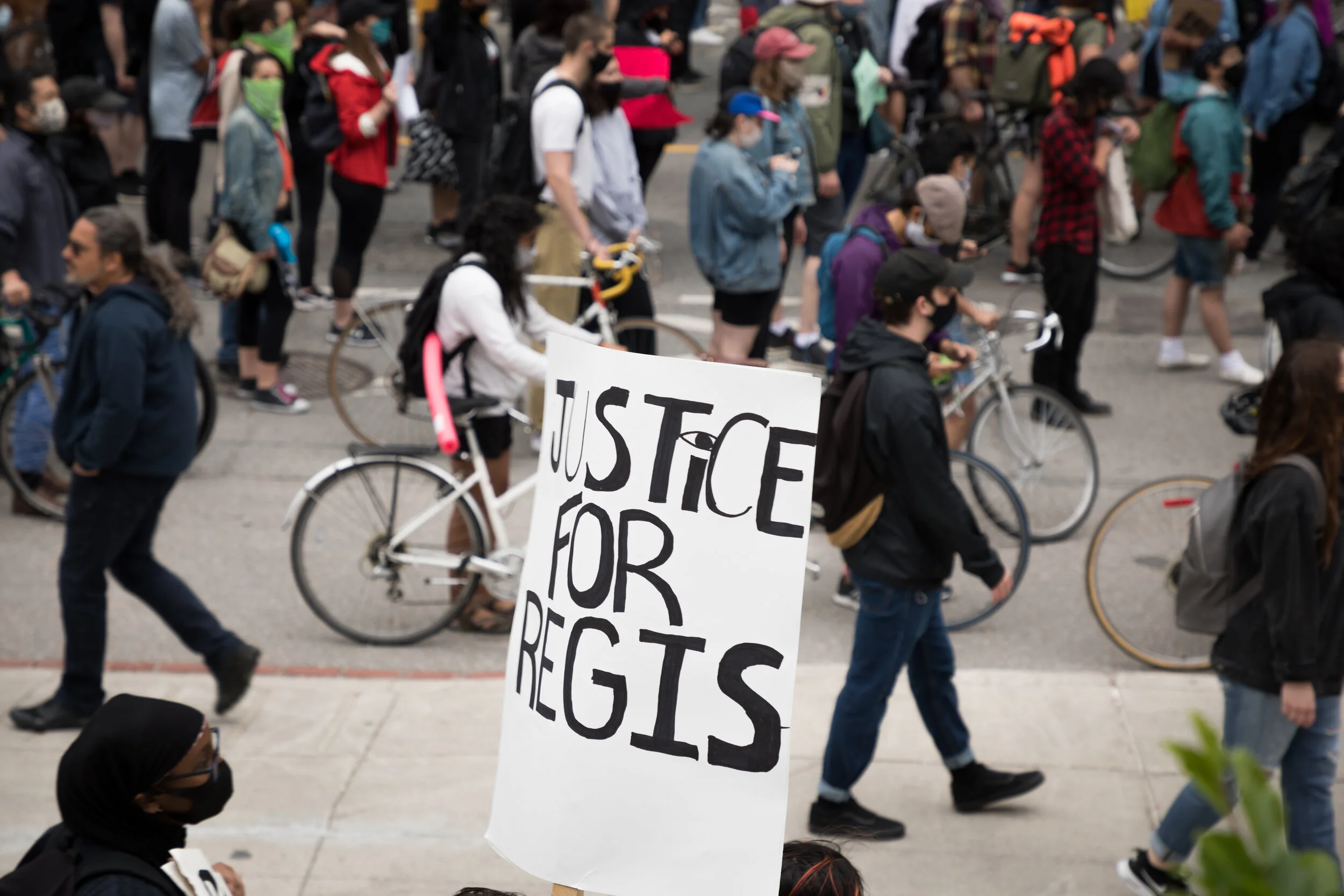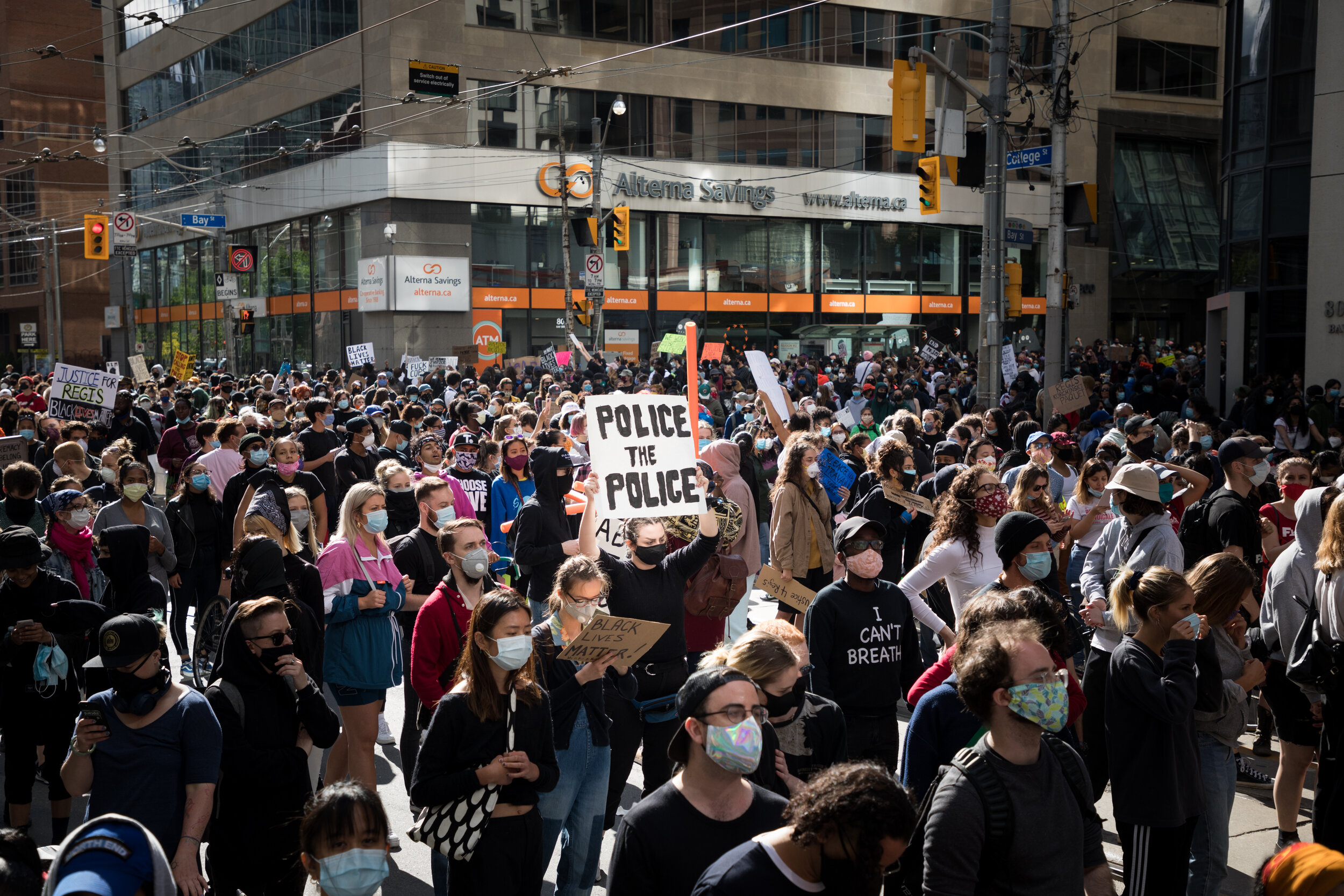People marching the streets of Toronto on May 30th to demand justice for Regis Korchinski-Paquet, who died while in Police presence.
Photo by Daniel Fast
PWB denounces police brutality, murder, and violence against Black communities.
We recognize and acknowledge our black brothers and sisters in so-called North America and all over the world. We see you, we feel for you, and we are with you in the fight for justice. None of us are free until all of us are free.
We honour the names: George Floyd, Amaud Arbery, Breonna Taylor, Regis Korchinski-Paquet, Eric Garner, Trayvon Martin, Sandra Bland, Alton Sterling, Tamir Rice...There are so many names. And it needs to stop. The systemic racism and injustice need to stop.
Why do Black Americans continuously have to justify why their lives matter when America was built on stolen land and on the backs of Black slaves? A rebellion is happening throughout the United States of America, against the systems that continue to uphold the views and values of white supremacy and racism.
Photographers Without Borders stand in solidarity with members of Black and Afro-Indigenous communities around the world, and with the Black Lives Matter movement. As a global community, PWB invites you to work with us to dismantle white supremacist ideologies, and encourage open discussions of community care strategies that do not rely on violence and the policing of BIPOC bodies.
Photo by Daniel Fast
Ways to Support:
Educate yourself and commit to the work.
Donate to community funds and family support funds.
@bailproject.org
@MNFreedomFund
@BLKLivesMatter
Call your local government representatives to demand justice and independent investigations to the murders of black individuals by police.
Sign petitions like justiceforbigfloyd.com
Photo by Daniel Fast
Support local Black-owned businesses and photographers and journalists.
Educate yourself on police brutality and the racial and structural dynamics of policing. Learn about the history and dynamics of white supremacy so you can recognize it. Share your knowledge with others around you, including family and friends.
White and non-Black allies can show support by showing up at rallies in your city and using your privilege to maintain peace and protect Black community members from police intervention. Listen to the direction of Black leaders while participating in actions. Remember that being an ally is not a badge to wear; it is earned by showing up and doing the work. If you can’t physically show up, sending food, water or donations to bail-out funds.
Media/white photographers: Consider giving Black photographers the paid work. To name a few:
@anthonybgeathers @byalexishunley @cocoa.butter.shutter @demetrius.freeman @jdthecombo @khickmanphotography @lnweatherspoon @michaelnoblejr @lytevisuals @malikesidibe @mark.c @sbmaneyphoto @tonemobley @vanessa.charlot @ivy.ceballo @laylahb @patiencezalanga @kevinclaiborne @sylviajarrusphoto @implied_wisdom @malikmphotography @alyssapointerphoto @r.coollens @stevesweatpants @cydnielledge @braylendion @phobymo @ga.briella @bydvnlln @flongala @visually_conscious @obzerb @henryjkeith @emackeycreates @joshualott @aptheangel @dolo_fotofoto @aljthompson.photo @ninarobinsonphoto @joshua_rashaad
FURTHER READING:
Why Organizers Are Fighting to Center Black Trans Lives Right Now
Black Trans Women Seek More Space in the Movement They Helped Start
READ:
How To Be An Antiracist by Ibram X. Kendi: Kendi takes readers through a widening circle of antiracist ideas—from the most basic concepts to visionary possibilities—that will help readers see all forms of racism clearly, understand their poisonous consequences, and work to oppose them in our systems and in ourselves.
Me and White Supremacy: Combat Racism, Change the World, and Become a Good Ancestor by Layla F. Saad: Me and White Supremacy takes readers on a 28-day journey of how to dismantle the privilege within themselves so that they can stop (often unconsciously) inflicting damage on people of colour, and in turn, help other white people do better, too.
Black Feminist Thought: Knowledge, Consciousness, and the Politics of Empowerment by Patricia Hill Collins: In Black Feminist Thought, originally published in 1990, Patricia Hill Collins set out to explore the words and ideas of Black feminist intellectuals and writers, both within the academy and without.
So You Want to Talk About Race by Ijeoma Oluo: Ijeoma Oluo guides readers of all races through subjects ranging from intersectionality and affirmative action to "model minorities" in an attempt to make the seemingly impossible possible: honest conversations about race and racism, and how they infect almost every aspect of American life.
White Fragility: Why It’s So Hard For White People To Talk About Racism by Robin DiAngelo: In this in-depth exploration, DiAngelo examines how white fragility develops, how it protects racial inequality, and what we can do to engage more constructively, and “allows us to understand racism as a practise not restricted to ‘bad people’”.
FOLLOW:
@rachel.cargle
@novareidofficial
@tamikadmallory
@sonyareneetaylor
@mireillecharper
Organizations TO SUPPORT:
@BailProject: The Bail Project is an organization that believes no one should be in jail because of poverty. They provide free bail assistance, reunite families and restore the presumption of innocence.
@mnfreedomfund: The Minnesota Freedom Fund pays criminal bails and immigration for those who can’t afford to, as they seek an end to discriminatory, coercive, and oppressive jailing.
@blklivesmatter: This is the official account for the #BlackLivesMatter Global Network. BLM is a call to action & response to anti-Black racism.
@naacp: The NAACP was founded in 1909, and is the first and largest grassroots-based civil rights organization in the U.S.
@audrelordeproject: Audre Lorde Project is a community organizing centre for LGBTSTGNC people of colour communities.
LISTEN:
1619: 1619 is a New York Times audio series, hosted by Nikole Hannah-Jones, that examines the long shadow of American slavery.
Good Ancestor Podcast: An interview series with change-makers and culture-shapers exploring what it means to be a good ancestor. Hosted by globally respected speaker, anti-racism educator, and New York Times bestselling author of Me and White Supremacy, Layla F. Saad.
About Race with Reni Eddo-Lodge: From the author behind the bestselling Why I’m No Longer Talking to White People About Race comes a podcast that takes the conversation further. Featuring key voices from the last few decades of anti-racist activism, this podcast looks at the recent history that leads to the politics of today.
Pod for the Cause: This podcast, by The Leadership Conference on Civil and Human Rights, expands the conversation on critical civil and human rights challenges of our day: census, justice reform, policing, education, fighting hate & bias, judicial nominations, fair courts, voting rights, media & tech, economic security, immigration, and human rights.
Intersectionality Matters: Intersectionality Matters! is a podcast hosted by Kimberlé Crenshaw, an American civil rights advocate and a leading scholar of critical race theory.
WATCH:
PWB CODE OF ETHICS
1.
People have voices; we amplify them and strive to decolonize the storytelling process. Why? Because nearly every problem we seek to address today was in some way caused by unchecked colonialism and capitalist frameworks.
Decolonization is a lifelong process of learning, unlearning, and dismantling white supremacy and the system some of us benefit from or are oppressed by, in order to seek justice.
2.
Strive to be a good ally and collaborator at all times. Be aware of your positionality and privilege, while learning and listening as much as possible.
Being an “ally” is not something you can claim or wear like a badge; instead it is something that is earned through showing up however and whenever it is asked of (if not every day) by the communities affected, and doing the hard work involved. More resources here.
3.
Do no harm to subjects directly or indirectly (mental, physical or emotional). Treat all subjects with respect and dignity. Strongly consider not revealing identities of those who may be harmed by your images.
4.
Represent people and communities accurately as possible while avoiding stereotypes, “white saviour”/colonial/centring/oppressive narratives, shaming, romanticism, cultural appropriation, anti-Blackness, cultural fetishism/exoticism, and limiting personal biases. Some frames, narratives and language that are widely accepted need to be challenged and changed.
5.
Obtain explicit consent especially for capturing the likeness of vulnerable peoples (children, those with disabilities, marginalized persons, etc).
6.
Retain integrity of the image, story and subject matter during the editing and culling process.
7.
Do not accept compensation, favours or gifts that might influence the outcome of the project. Only give gifts if it is culturally-appropriate.
8.
No selfies or photographs with wildlife. The values and narratives we promote or don’t promote make a difference.
STANDARDS OF PRACTICE
Photos should respect human dignity and ensure the rights, safety and well-being of the person or people being portrayed.
Comply with local traditions or restrictions when taking photos of people, objects or places.
Inquire into national laws related to photography and privacy rights.
Gain verbal or written consent before taking photographs.
Respect a person’s right to refuse to be photographed. If you sense any reluctance or confusion, refrain from taking the photo.
Do no harm. Individuals or groups may be put at risk of reprisal, violence or rejection in their communities as a result of exposing their identity or personal story through the publication of their image.
Do not misrepresent the individual, situation, context or location of the photo.
Photos of issues that are culturally or politically sensitive must protect the identity and privacy of individuals without explicit permission.
Do not identify individuals. Position the camera so that faces and other unique characteristics cannot be seen.
Gain written consent to use real names and locations in situations where disclosure could result in harm. Otherwise, remove detailed personal information such as names and locations in captions or any other associated documentation.
Identifiable images of individuals should not be used to illustrate sensitive subject matter in such a way as to indicate that the individual is connected with the issue.
Photos of people who are vulnerable are to be taken with particular care, compassion and protection of privacy.
Photograph all people with respect and dignity. Special care and compassion must be exercised with vulnerable subjects.
Survivors of sexual exploitation, gender-based violence or abuse are not to be identified as such (unless it is an objective of a project with written consent).
An individual’s status as a person living with HIV, TB or any other serious health conditions must not be revealed without written consent.
An individual’s engagement in socially marginalised or criminal activities must not be identified without written permission.
Care must be taken in photographing people in times of crisis; Do not exploit an individual’s vulnerability at times of trauma or grief. Integrity must outweigh costs.
MORE STORIES OF GRASSROOTS HEROES
by Photographers Without Borders














